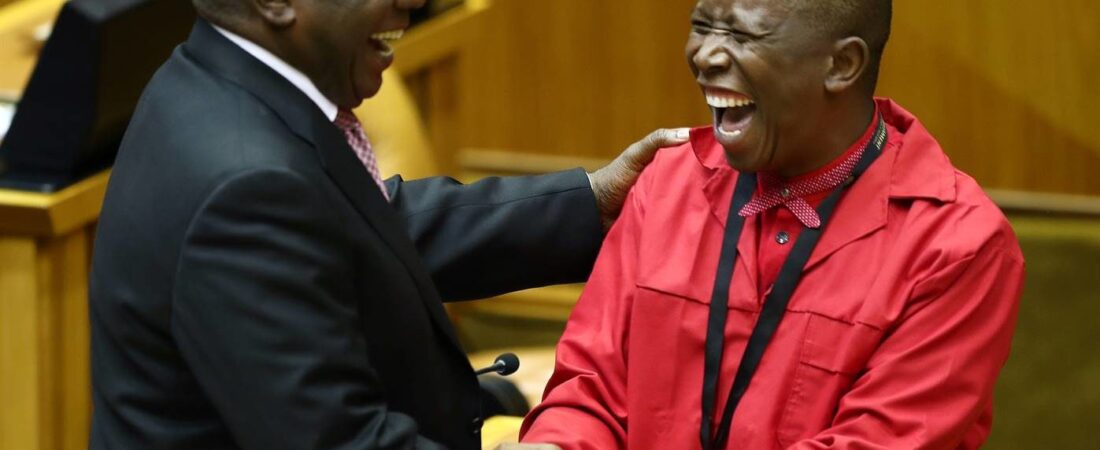In the high-stakes theatre of South African politics, President Cyril Ramaphosa has often been lauded as a master strategist, a leader navigating the treacherous currents of his party and the state with a steady hand. Yet, his latest move—an attempt to sideline the embattled Minister of Police, Senzo Mchunu—has prompted a fierce constitutional challenge that threatens to turn a political crisis into a legal quagmire. A scathing letter from England Slabbert Attorneys, acting for the Economic Freedom Fighters (EFF), lays bare the profound legal flaws in the President’s strategy, arguing his solution is not a deft manoeuvre but an unconstitutional overreach.
The saga began with a public bombshell. Lieutenant-General Mkhwanazi, the Provincial Commissioner for KwaZulu-Natal, levelled explosive allegations against Minister Mchunu, accusing him of interfering in sensitive investigations, colluding with accused persons, and effectively dismantling critical police task teams. In a televised address on Sunday, , the President responded. He announced a Judicial Commission of Inquiry and, in a move he likely saw as a prudent middle ground, placed Minister Mchunu on an “indefinite leave of absence.”
This “leave of absence,” however, is the very foundation of the EFF’s legal assault. The letter, sent to the Presidency today, argues with stark clarity that the South African Constitution simply does not grant the President the power to place a Cabinet Minister on leave. Citing $Section \ 91(2)$ of the Constitution, the EFF’s lawyers contend that the President’s powers are explicit: he may appoint Ministers, assign them powers, and dismiss them. There is no provision, they argue, for a “Minister on leave”—a phantom executive who retains the title and benefits of office but is stripped of all function.
This is not mere legal pedantry; it strikes at the heart of executive authority and accountability. The EFF compellingly frames the President’s action as an unlawful “precautionary suspension” in disguise. The result is a constitutional anomaly: a Minister who is not a Minister, drawing a full salary from the public purse while performing no duties. This, the letter asserts, creates the absurd situation where the taxpayer will effectively pay twice for one job—once for the suspended Minister Mchunu, and again for the appointed Acting Minister.
The President’s plan to appoint Professor Firoz Cachalia as the “Acting Minister of Police” from is the second pillar of the EFF’s challenge. They argue that the concept of an “acting” Member of Cabinet who is not a full member is another legal fiction. To wield the powers of a Minister, one must be appointed as a Minister. Professor Cachalia cannot simply “act” in the role; he must be formally appointed to the Cabinet. The President’s attempt to create a temporary, acting position without a formal appointment is portrayed as a circumvention of constitutional processes.
Beyond the procedural illegalities, the EFF mounts a powerful argument on the grounds of rationality and ethics. They posit that the President’s failure to dismiss Minister Mchunu outright is, in itself, an irrational decision that breaches the doctrine of legality. The allegations by Lt-Gen Mkhwanazi, they argue, are so severe that they automatically place Minister Mchunu in breach of $Section \ 96(2)(b)$ of the Constitution, which prohibits Ministers from acting in any way that is inconsistent with their office or exposes them to a conflict between their official responsibilities and private interests.
By choosing “leave” instead of dismissal, the President has tried to walk a political tightrope. He has attempted to signal decisive action to the public while avoiding the internal political fallout of firing a powerful figure before a Commission of Inquiry delivers its findings. But in doing so, he has created a solution that, according to this legal challenge, is constitutionally baseless.
The letter from England Slabbert Attorneys is more than a political jab from an opposition party; it is a meticulously constructed constitutional argument. It transforms a political headache for the President into a fundamental question about the rule of law. Can the President invent executive powers not explicitly granted by the Constitution to solve a political problem? The EFF’s answer is a resounding “no.”
President Ramaphosa now finds himself in an unenviable position. To ignore the challenge is to risk having his decision overturned by the courts, a move that would be deeply embarrassing and undermine his authority. To acquiesce would be to either fire Minister Mchunu—the very action he sought to avoid—or reinstate him, which would be politically untenable given the gravity of the allegations.
This showdown forces a crucial debate on the nation. Is it acceptable for a Minister to remain in office, shielded by a legally dubious “leave of absence,” while grave allegations hang over their head? The EFF has drawn a line in the sand, not just for itself, but for the principle of constitutional supremacy. The coming days will reveal whether the President’s constitutional gambit will hold, or whether it will unravel into a defining legal and political crisis of his second term.






